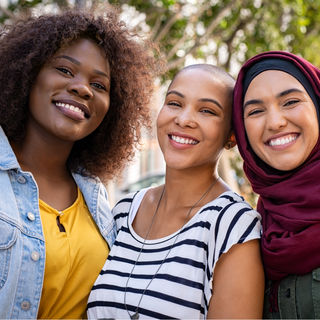Trauma
Ancestral Trauma, Eating Disorders, and Addictions
Can trauma be passed down from generation to generation?
Posted July 14, 2019

Have you ever thought about traumatic experiences as having their roots in the lives of your parents or grandparents? Trauma can be defined as the loss of an essential part of ourselves—a sense of safety, trust, or security.
Trauma ultimately has the ability to define our behaviors, actions, and sense of self. Research is also showing the destructive effects of trauma being passed down from generation to generation in our DNA and cultural nurturing.
Trauma occurring before the age of 18 is particularly harmful. Child maltreatment is a significant public health problem. It is estimated that one out of every 10 children in the United States experiences one or more forms of physical, sexual, or emotional abuse or neglect by a parent or other caregiver at some point during their lifetime.
It is well-established that experiencing childhood maltreatment is associated with a variety of negative physical, emotional, and psychological outcomes, including subsequent harsh and/or neglectful parenting in adulthood. Childhood maltreatment is associated with higher risks for obesity, substance use, depression, anxiety, eating disorders, and over 40 medical conditions, including heart disease, diabetes, and cancer. This is what we know and have known for over a decade.
What has not until recently been part of the conversation is the impact of intergenerational or historical trauma—trauma passed down through generations. Trauma from the Holocaust, from studies on American Indians and Alaska Natives (AIAN), and trauma from slavery, racism, and oppression in African-Americans can be transmitted to future generations through epigenetics, parental modeling, and cultural experiences. Dr. Maria Yellow Horse Brave Heart describes historical trauma as “…the cumulative emotional and psychological wounding over one’s lifetime and from generation to generation following the loss of lives, land, and vital aspects of culture.”
This type of trauma was initially studied in children and grandchildren of Holocaust survivors in the 1960s. The offspring of Holocaust survivors showed a variety of trauma response pathology and experienced themselves as “different or damaged” by their parents’ experiences (Sotero, 2006). Studies on families of Holocaust survivors show an association between eating disorders and Holocaust exposure and also the transmission of trauma down through the third generation (Bar-On et al., 1998).
More recent studies in American Indian and Alaska Native (AIAN) populations have shown the trauma of what one researcher has called the American Indian Holocaust. Researcher Brave Heart also developed a lexicon of terminology to describe the AIAN experience, including “historical unresolved grief,” to describe how the losses they suffered had never been mourned and the “survivor’s-child complex” to describe the similar dynamics among children of survivors and their descendants (Brave Heart and DeBruyn, 1998).
Researcher J.D. Leary (2005) described what she called post-traumatic slave syndrome (PTSS) in African-Americans—to reflect a condition that exists as a consequence of centuries of chattel slavery followed by institutionalized racism and oppression. Generations after slavery, children were witness to their parent’s or grandparent’s daily degradation at the hands of the broader culture.
The notion of traumatic effects of enslavement being transferred to successive generations starts with the idea that slavery was not only a dreadful individual ordeal, but also a cultural trauma to African-American people—a syndrome which occurs when a group has been subject to an unbearable event or experience, thereby undermining their sense of group identity, values, meaning and purpose, or their cultural world views, and is manifest in symptoms of hopelessness, despair, and anxiety (notably, among indigenous people subject to colonization and genocide and Holocaust survivors).
Cultural trauma can be described as a “loss of identity and meaning, a tear in the social fabric” (Eyerman, 2001). Maya Angelou (1976) has said, “It is collective memory of slavery that defines an individual as a “race member.”
For people with historical trauma, the transmission of their trauma to their children is unintentional but stems from their own pain which has not been dealt with. Unwanted behaviors, such as eating disorders or addictions, may have their roots in this intergenerational trauma, which creates a vicious cycle of unprocessed grief and shame leading to unwanted behaviors, which only cause more pain, guilt, and shame. But the good news is that we possess the power to change when we are willing to address these painful memories and move from surviving to thriving.
When people think, talk, or share about trauma, it usually takes on the form of all the harm it causes. While this is all true and important to acknowledge, it is also true that there are often gifts that can come from trauma, even the trauma that is passed down through generations. If we embrace the scars as a way of affirming our survival and recognize that by surviving the pain of the past, we know we are able to face anything that life has to throw at us, then our past experiences can become gifts that we can also teach to our children and grandchildren. The CDC has identified the promotion of safe, stable, nurturing relationships (SSNRs) as a key strategy for the public health approach to child maltreatment prevention. SSNRs begin with healing from your own trauma, so that you are more able to use what you learn to help prevent the cycle of trauma in subsequent generations.
For too many individuals, trauma carries a stigma that they may feel forever like victims stuck in a life that they do not deserve. When you are able to own your entire experience—cultural and historical—you may find that the gifts from trauma have made you the powerful human being you are today.
References
Bar-On D, Eland J, Kleber RJ, Krell R, Moore Y, Sagi A, van Ijzendoorn MH. Multigenerational perspectives on coping with the Holocaust experience: An attachment perspective for understanding the developmental sequelae of trauma across generations. International Journal of Behavioral Development. 1998;22(2):315–338.
Brave Heart MYH, DeBruyn LM. The American Indian Holocaust: Healing historical unresolved grief. American Indian and Alaska Native Mental Health Research. 1998;8(2):56–78.
Campbell CD, Evans-Campbell T. Historical trauma and Native American child development and mental health: An overview. In: Sarche M, Spicer P, Farrell P, Fitzgerald HE, editors. American Indian and Alaska Native Children and Mental Health: Development, Context, Prevention, and Treatment. Santa Barbara, CA: Praeger; 2011. pp. 1–26.
Leary, J. D. (2005).Posttraumatic slave syndrome. Milwaukee, OR: Uptone Press
Felitti VJ, Anda RF. The relationship of adverse childhood experiences to adult health, wellbeing, social function and healthcare. In: Lanius R, Vermetten E, Pain C, editors. The hidden epidemic: The impact of early life trauma on health and disease. Cambridge University Press; 2010.
Alim TN, Charney DS, Mellman TA. (2006) An overview of posttraumatic stress disorder in African Americans. Journal of Clinical Psychology, 62(7): 801-813.
Trottier K, MacDonald DE. (2017) Psychological trauma, other severe adverse experiences and eating disorders: state of the research and future research directions. Curr Psychiatry Rep; 19(8):45.
Sotero M, (2009) A conceptual model of historical trauma: Implications for public health practice and research. Journal of health disparities research and practice; 1(1): 93-108.
Danielli Y, Norris FH, Engdahl B. (2016) Multigenerational legacies of trauma: modeling the what and how of transmission; 86(6):639-51.
Mercy JA, Saul J. Creating a healthier future through early interventions for children. JAMA 2009;301:2262e4.




